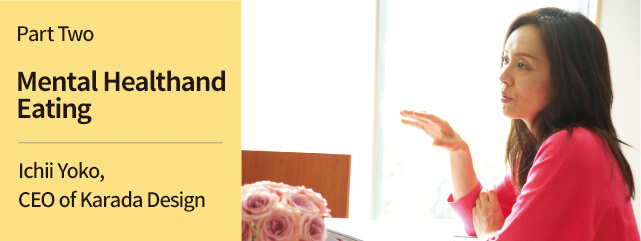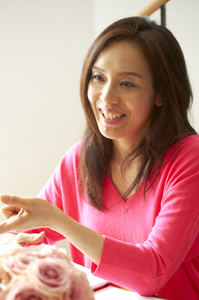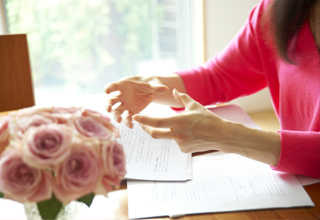Food as Medicine: Everyday Eating for Wellness and Beauty
May 17,2013
Food as Medicine: Everyday Eating for Wellness and Beauty
May 17,2013
In this series, our editors Nobue and Miyoko speak with experts on such topics as food, customs, Japan, and traditional lifestyles.

Miyoko:I’m sleepy all the time and I can’t seem to get myself motivated. Maybe I have May sickness.
Nobue:Are you okay?
Miyoko:I’m not sure. The weather has changed since the start of spring, and I feel drained.
Nobue:Feeling down or agitated happens sometimes. Let’s have a talk with Ichii again today.
Miyoko:Ichii, I find I don’t have any energy or get-up-and-go lately. What’s going on? I feel a bit on edge and I can’t concentrate.
Ichii:What do you do when you feel this way?
Miyoko:I get a craving to snack on something. Something sweet like chocolate. I feel that if I eat some sweets I can recover from fatigue and get back in the groove.
Nobue:I know exactly what you mean. I always keep some chocolate in my desk.
Ichii:I bet there are many people like you. But if you gave up the sweets, you might be able to get your energy back.
Nobue:Huh? Really?
Ichii:Have you heard of the sympathetic and parasympathetic nervous systems?
Miyoko:I hear those terms a lot, but I’m not exactly clear on them.
Ichii:To greatly simplify, the sympathetic nervous system dominates when you’re active or tense or when you feel stressed. The parasympathetic nervous system dominates when you are at rest or relaxing or when you are asleep. The two systems work alternately. Interestingly, when you are eating, the parasympathetic nervous system dominates. When you are irritable and you start to crave something to eat, it’s likely that you are unconsciously attempting to activate the parasympathetic nervous system.

Ichii:How do you eat at lunchtime?
Miyoko:I’m quite busy these days, so I often eat quickly at my computer.
Nobue:When I’m busy, I sometimes do the same. And not only lunch, but in the evenings too, I can’t seem to settle down and eat…
Ichii:When you are working and in a tense state, your sympathetic nervous system is activated. At lunchtime, you should relax and let the parasympathetic nervous system dominate. And when you switch back to work mode, the sympathetic nervous system will take over again. This alternating between the two systems is necessary. However, if your parasympathetic nervous system does not effectively dominate during your lunch break or after work, then you will remain in a tense state and your body will start to crave some stimulation. For some people, that might be coffee; for others, chocolate. By consuming these things and stimulating yourself, you are trying to force the parasympathetic nervous system to take control.
Miyoko:I can relate to that…
Ichii:After lunch, have you ever experienced feeling sluggish and unable to think clearly because you overate?
Miyoko:Definitely.
Ichii:That’s a sign that you have relaxed too much and that your parasympathetic nervous system is overly dominant.
Nobue:I sense that I’m more productive at work when I’m hungry.
Ichii:When you eat, more of your blood flows to the stomach, slowing down your brain function.
Nobue:I see.
Ichii:Do you have a habit of regularly eating sweets? If you keep eating sweet foods constantly, you can end up in a state similar to sugar addiction.
Nobue:Sugar addiction?
Ichii:That’s right. I see sugar as a type of stimulant, along the lines of caffeine, nicotine, and alcohol. These stimulants have addictive properties.
Nobue:So sugar is also a stimulant…
Ichii:Excessive sugar intake can escalate into hypoglycemia. When sugar enters the body and blood sugar levels rise, the body releases insulin to lower the blood sugar level. Hypoglycemia occurs when this cycle repeats frequently, causing the pancreas to malfunction and produce too much insulin. Surprisingly, approximately 40 percent of adult Japanese people are estimated to have hypoglycemia. Additionally, hypoglycemia can cause symptoms such as irritability, anxiety, forgetfulness, mood swings, difficulty concentrating, fatigue, and a constant craving for sweets.
Miyoko:Wow. Those symptoms sound very familiar…
Ichii:If you are feeling those symptoms, make sure to rest properly when you rest and eat while you are relaxed so that the parasympathetic nervous system dominates. And you should take care not to eat too much food that is high in sugar that causes your blood sugar levels to spike. On the other hand, the brain uses carbohydrates as energy to function, so restricting carbohydrates too much is not good either. Try to incorporate unrefined brown sugar or similar options into your diet. These are rich in vitamins, minerals, and dietary fiber, which help avoid spikes in blood sugar levels and prevent excessive insulin secretion.

Ichii:People today internalize all kinds of stress. These stresses can even develop into mental health issues. In my opinion, it is not easy to overcome such issues by focusing solely on improving your mental state.
Miyoko:Is that so?
Ichii:At the end of the day, the mind and body are interconnected. That’s why I believe that regulating your body’s condition can pull your mental state in a positive direction. When your body is tired, you are more likely to get a cold or develop skin problems or have an acne breakout, right?
Nobue:Absolutely.
Ichii:These outbreaks just happen to occur where you can notice them. When your skin breaks out, you know that you are probably fatigued or stressed out. But similar problems can occur in the mind, which you can’t see on the surface. This is why we can’t separate physical illnesses from mental illnesses.
Miyoko:I get it, but you can’t walk away from your job instantly because you are tired or stressed.
Ichii:For sure. That’s why I recommend paying attention to your diet, which is the easiest thing you can control in your daily life, and regulate your physical condition. I believe this will have positive benefits for your mental well-being too.
Miyoko / Nobue:That makes sense.

Miyoko:Are there any things to keep in mind when eating to regulate your physical condition?
Ichii:I’m sure you’ve heard that the gut has both good bacteria and harmful bacteria. The most well-known of the harmful bacteria is probably E. coli. This bacteria thrives on meat and other animal proteins. Good bacteria, on the other hand, thrive on dietary fiber and fermented foods. The majority of other bacteria in the gut are called opportunistic bacteria, which are neither good nor bad. Opportunistic bacteria ally themselves with the dominant bacteria in the body. So in a body where good bacteria are active, the opportunistic bacteria support the good bacteria, but if the harmful bacteria are more active, the opportunistic bacteria will support the bad bacteria.
Nobue:I had no idea.
Miyoko:When harmful bacteria are active, the opportunistic bacteria take their side. But that is reversed when good bacteria are more active…
Ichii:That’s right. One of the major reasons why traditional Japanese cuisine is said to be healthier than Western diets, which are centered on meat, is these workings of bacteria. And as we know that psychological stress often manifests in the stomach, the gut and intestines are closely related to the mind. We know medically that keeping your gut health in balance is definitely a direct way to balance your mental well-being.

Nobue:Listening to you, it makes me realize again that eating is something we cannot afford to neglect.
Miyoko:The problem is we lead such busy lives that it’s not easy to always pay attention to what we eat.
Ichii:That’s true. But I believe that looking after your health is your lifestyle. Putting it another way, what and how you eat defines how you live. Just like what clothes you wear, what house you live in, and who you spend time with are personal choices, so too are what and how you eat and, ultimately, how you die. Being a workaholic and neglecting what you eat because you are “busy” and letting your physical condition deteriorate are all personal choices. Conversely, being so obsessed over what you “mustn’t” eat that you can’t share in delicious food with others is also a choice. These are extreme examples, of course, but the answer to what is right and what is wrong lies in your own mind and body, and no one can make sweeping, generalized statements about these things. This touches on what we discussed in Part 1, but it’s very important to cultivate a supple and highly attuned body and mind that can hear the signals from the body and mind and can sense changes. We are what we eat, so we should contemplate on this idea and make choices that are true to ourselves.
Nobue:I agree wholeheartedly.
Miyoko:I’ll try thinking more conscientiously about what I eat day to day.
Nobue / Miyoko:Thank you so much for your time today, Ichii.

CEO of Karada Design
CEO of Karada Design
Based on the principles of holistic medicine, Ichii has developed healing food, a concept for simple, sustainable dietary improvements that respects the body’s natural rhythms, and self-body design, a method of balancing muscle tone and energy flows and regulating the body. With these methods, she guides people on enjoyable holistic self-care lifestyles.
Ichii is a certified physical therapist, certified chronic disease prevention therapist, holistic self-care coordinator, healing food researcher, a professional member of the Japan Holistic Medical Society and Kanto administration committee member, and member of the Natural Hygiene Promotion Association.
She is the author of Chiropractic Care for Women Over 40: Stay Beautiful for Life (Aspect).